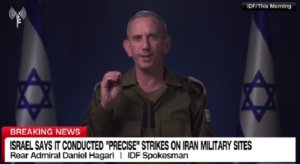Early Saturday morning, Israel launched direct military strikes on Iran, marking a high-stakes retaliation against Tehran following Iran’s earlier ballistic missile attack. This operation specifically targeted military locations, and according to Israeli sources, energy infrastructure was not impacted.
Iran’s Response
- Iranian Reaction: Iran asserted its right to self-defense, though state media minimized the scale of damage, reporting limited impact to military installations across three provinces. Iran’s military confirmed the death of two soldiers in the attack.
- Downplaying the Situation: Reports in Iranian media have not fully elaborated on the extent of the strikes, suggesting an attempt to reduce the event’s perceived severity domestically.
The United States’ Involvement
- Biden’s Influence: A senior U.S. official revealed that President Joe Biden advised Israel to plan its counterattack in a way that would deter further escalation. The international community, including U.S. leadership, has encouraged restraint on both sides to prevent a broader regional conflict.
Additional Tensions in Gaza
- Raids and Detentions: In a related development, Israel has detained several male staff members during a raid on Kamal Adwan Hospital in northern Gaza. The UN human rights chief expressed concern, accusing Israel of subjecting Gaza’s population to extensive bombings and a potential humanitarian crisis.
International Reactions and Concerns
Leaders worldwide are calling for calm and urging both Israel and Iran to avoid steps that could lead to wider regional warfare. This series of events further complicates an already fragile Middle Eastern landscape and underscores the potential for broader escalations.
















